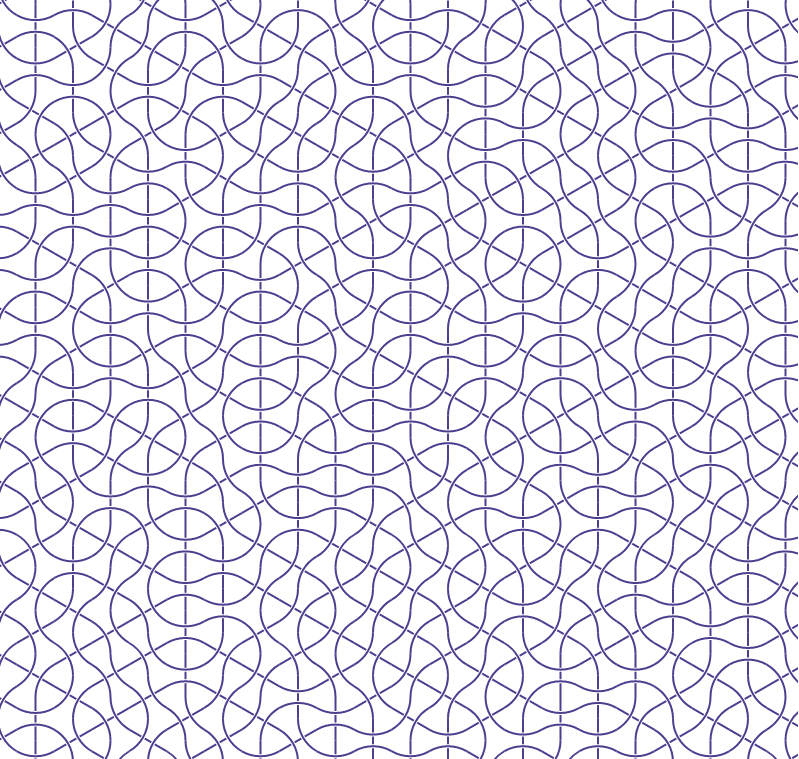Hexagonal Truchet tiling
Posted on 28 April 2020
Following on from this earlier post, here is a class, TruchetHexes, which generates a pleasing weave-like pattern by tiling the following hexagon shapes in random orientations.
A typical image looks like this:

This code requires the truchet.py file from this previous post on Truchet tiles.
import numpy as np
import random
from truchet import Truchet
class TruchetHexes(Truchet):
"""A class for creating a Truchet tiling of hexagons."""
def __init__(self, width, height, s, colour):
super(TruchetHexes, self).__init__(width, height, s)
self.colour = colour
@Truchet.defs_decorator
def svg_styles(self):
print('.arc {{ stroke: {}; stroke-width: 2px; fill: none; }}'
.format(self.colour), file=self.fo)
print('.hex {{ stroke: {}; stroke-width: 2px; fill: none; }}'
.format('#eeeeee'), file=self.fo)
def svg_shape(self, r=None, rule=None):
"""A Truchet figure based on interlinking circular arcs."""
def arc_path(A, B, r):
"""Semicircular arc path from A=(x0,y0) to B=(x1,y1), radius r."""
print('<path d="M{},{} A{},{} 0 0 1 {} {}" class="arc"/>'.format(
*A, r, r, *B), file=self.fo)
def line_path(A, B):
"""The straight line "under" the curved arcs.
NB for now, the "rule" is ignored: only a random weave is produced.
"""
# Unit vector across the hexagon.
V = B - A
V /= np.hypot(*V)
# Adjust the padding according to the line width to leave a gap
# either side of the arc weaving "above" it.
pad = 0.08
g1 = self.s * ((3 - np.sqrt(3))/2 - pad)
g2 = self.s * ((3 - np.sqrt(3))/2 + pad)
Q = np.array([A, A + g1*V, A + V * g2, B - V * g2, B - V * g1, B])
print('<path d="M{} {} L{} {} M{} {} L{} {} M{} {} L{} {}"'
' class="arc"/>'.format(*Q.ravel()), file=self.fo)
f1, f2 = 3/2, np.sqrt(3)/2
if not r:
r = self.s * f1
for ix in range(self.nx):
for iy in range(self.ny):
# The centre of this hexagon.
x0, y0 = (ix * self.s * f1,
iy * self.s * (f2*2) + self.s*f2*(ix % 2) )
# The mid-points of each side of the hexagon.
P = np.empty((6,2))
P[0] = 0, -self.s * f2
R = np.array(((0.5, -f2), (f2, 0.5)))
P[0] = (0, - self.s * f2)
for i in range(1,6):
P[i] = R @ P[i-1]
P += (x0, y0)
# If we're drawing the hexagons themselves, these are their
# vertices.
Q = np.empty((6,2))
Q[0] = self.s/2, self.s * f2
for i in range(1,6):
Q[i] = R @ Q[i-1]
Q += (x0, y0)
# If drawing the hexagons, uncomment these lines.
#print('<path d="M{} {} L{} {} L{} {} L{} {} L{} {}'
# ' L{} {}z" class="hex"/>'.format(*Q.ravel()),
# file=self.fo)
# Randomly orient the hexagon by cyclicly shifting the
# coordinate rows 0, 1 or 2 times.
P = np.roll(P, random.randint(0,2), axis=0)
# Draw the arcs and line.
arc_path(P[0], P[4], r)
arc_path(P[3], P[1], r)
line_path(P[2], P[5])
if __name__ == '__main__':
truchet = TruchetHexes(800, 800, 25, colour='#4f3e90')
truchet.make_svg('hexes.svg')
